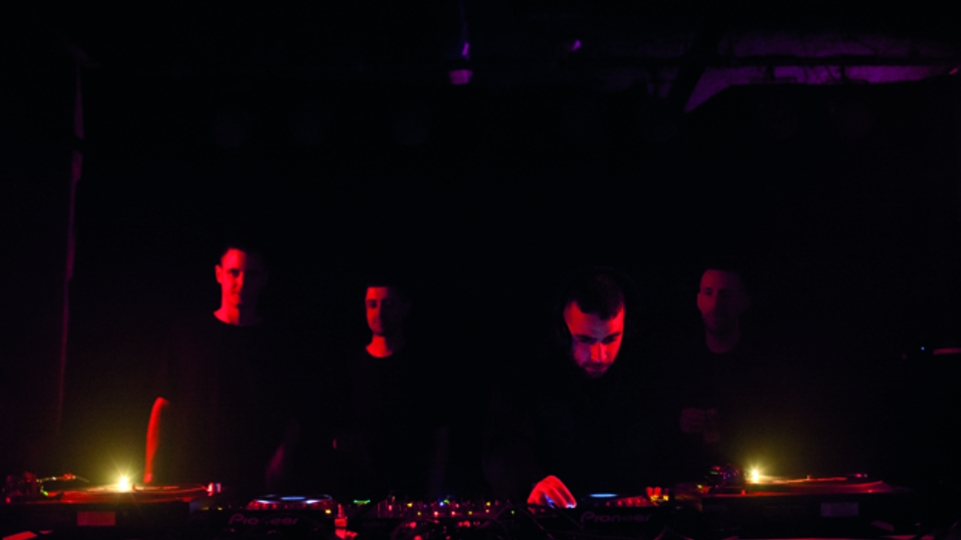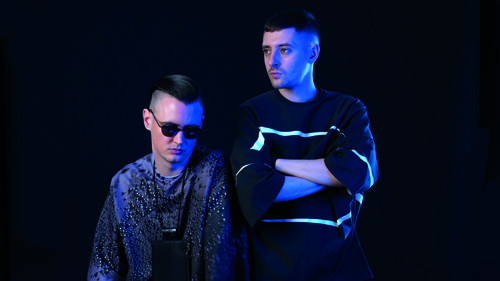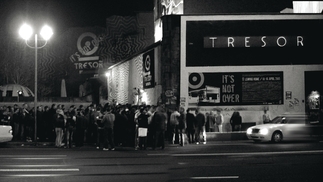NIGHTSLUGS: CREATURES OF THE NIGHT
Raised on soundsystem culture, deep bass and inventive, cross genre music, Night Slugs co-owners and DJ/producers L-Vis 1990 and Bok Bok have created a label, musical family and aesthetic steeped in innovative dance tradition, but constantly pushing into new sonic territory. Drawing from the past but future-bound, their unique flavour's never been more in demand. We catch up with the two in London to find out the story so far, and what's next...

February, early 2014, Peckham. The Night Slugs crew have announced that they will be holding a Boiler Room label showcase in a secret Peckham location. Tickets are guestlist only and ultra-limited. The line-up; L-Vis 1990 and Bok Bok, joined by Girl Unit (using his club-smashing Hysterics alias) and Night Slugs young blood Deamonds and Neana. So far, so Boiler Room — which is probably why no one was quite ready for what followed: joyous, chaotic mayhem. Footage of the event shows the venue rammed, taut with excitement, L-Vis and Bok Bok rocking at the heart of a human maelstrom.
Whilst the massed South Londoners jump up, wile out, and cheer, the DJs trade tune for tune, their set spanning the globe, with grime, techno, house, Jersey club, B-more, footwork and garage spiralling into one another, forming a mutant, pulse-racing genre that can’t and won’t be trapped with one name. Call it ‘Night Slugs music’ if you will. The event was never going to be a hushed Boiler Room chin stroker; situated 20 minutes away from the venue where the first Night Slugs party was held back in 2008, it was a triumphant homecoming, and a gauge of just how far they’ve come.
“This year it felt like the reception to the label just changed — almost overnight,” says James ‘L-Vis’ Connolly. “And it all started with that Boiler Room show down in Peckham. We had queues of kids running five blocks down the road. The response was incredible!”
DJ Mag is sitting in an ornate Kings Cross hotel with Connolly and his Night Slugs co-owner Alex ‘Bok Bok’ Sushon. Relentless schedules have made it hard to pin the two down to an exact date, and it’s telling that we should find ourselves here, as close to a transport hub as possible — Connolly has got an hour to talk before having to get a train to a gig in Nottingham.
This has been the Night Slugs story of 2014, with L-Vis and Bok Bok touring the planet, both individually and as a team, bringing their hybrid sounds to everywhere they can possibly manage. “We just had a big showcase in Tokyo,” Sushon says, “and the place was full of kids in Night Slugs shirts, they knew all the tracks, not just our tracks but the tracks that blow up in our sets, and they were going crazy — there’s a lot of Rinse listeners out there.”
“Tokyo was so special,” Connolly continues. “We had an hour at the end where the lights came on and we just kept on playing — I think we just played 100 bpm R&B for an hour after playing a load of footwork. And Shanghai was crazy, there’s this club out there called Shelter, it’s really grimy, it’s got a low ceiling, it smells of damp, it’s really darkly lit, and it just reminds me of the kind of clubs I used to go to when I was growing up. The energy was great there, a mix of Chinese and expat, and just excellent. Then in Australia we played Sydney Opera House with Phuture.”
“We’ve had a mad year!” Sushon enthuses. “We’ve been around for a minute now, and it’s got to the point where we don’t need to keep proving our relevance. When you’re a young, hungry label you have to keep re-stating yourself, whereas now we’re feeling kind of established. We go through periods of gestation and periods of activity — we were lying low, but now there’s a lot of energy going on, there’s a lot of new tunes being made, there’s young producers coming through.
We’ve got this far, and when we started doing this, the club environment was very different to what it is now — people have caught up a bit, if that doesn’t sound too arrogant.”
“It’s in our blood,” Connolly adds. “I’ve been a DJ for 15 years, Alex for 10, We’d be plugging away doing our thing no matter what.”

BUNKER MENTALITY
The pair have an easy way with each other, elaborating on one another’s points, and nodding along as the other speaks. Whilst Sushon is the more vocal of the two, with the quick-fire conversational confidence of someone who has grown up surrounded by South London geezers, Connolly is similarly certain in his opinions. They are both absolutely committed to the Night Slugs aesthetic, and have perfected a kind of tunnel vision to filter through the information deluge of the modern age.
“It’s hard to tell if we’ve even got a correlation with mainstream dance, because what’s played on the radio bears little similarity to what we’ll play in the club on a weekend,” Sushon starts. “People talk about how there’s no underground anymore, but culture is still layered. I’m trying to think of things positively these days — I need to keep my head clear, and keep believing in what I’m doing, and in order to do that you need to put yourself in a bunker a little bit.”
Connolly agrees. “I’m just concentrating on what’s happening in our crew, I’m not bothered about the greater scheme of things — I just play tracks by my friends, and I go hunting for old records, but taking myself out of London and going to New York, I’m in my own kind of world.”
Connolly moved to New York two years ago, and has since immersed himself in America’s underground dance culture, feeding the knowledge back into Night Slugs. In many ways it was a natural move — as the duo are keen to point out, the label was always international, with Toronto’s Egyptrixx and the LA-based Kingdom being among their first signings. Sushon insists that having half of the label management move to a different continent has made no difference to their operation. “Besides which,” he laughs, “I think of East London as a different country anyway. I probably see James more now he’s in New York...”
“London was really getting to me,” Connolly explains, “and I was feeling that pressure, but when I moved to New York that just came off. It’s an amazing city, you can feel like anything can happen, you can collaborate with different people, and not have to worry about what the rest of the world’s going to think.”
Having forged their relationships online before having physically met, the Night Slugs camp have a fair claim to being a pioneering label of the digital age. The internet’s ability to collapse time and distance has stamped itself all over their sound, and made sense of a release schedule that — in the space of back-to-back 12” releases — can switch from the futurescape R&B of Bok Bok and Kelela’s 'Melba’s Song', to a reissue of mid '90s vogue house banger 'Icey Lake', to L-Vis’s harsh, technoid 'Ballad 4D'.
“Time doesn’t exist,” Sushon states, mock cryptically. “It’s just nice to look at music without attaching a period to it. It really helps to be a more interesting DJ, in the same way that you don’t have to worry about genre too much if you keep thinking about songs and forms — context is really important, but you can take music out of a timeline and it’s much more interesting.”
“That’s how we DJ,” says Connolly, “we never think about genres and eras, we think about energy.”

BACK TO THE FUTURE
Whilst the tempos Night Slugs work with and the locations they work from may vary wildly, the aesthetic remains cohesive. Connolly expresses this in artistic terms. “We’ve built our own palette, everyone has certain elements, which is their sound, and other people on the label kind of take from that to create new pictures.”
Sushon then continues: “We’ve got common influences, so whilst the tracks might not come out sounding the same, we all like the same genres, and the same specific ideas in those genres. Each producer will do it in a unique way, but there’s a group pool of ideas. Things are interesting right now — there’s a lot of producers coming through that are taking influence from what we did early on, not just as a label, but also from me and James DJing on Rinse — in fact Neana told me that Night Slugs was his first rave.
The tracks we play made this next wave go and get really into those genres, and now they have their own take on them. At the same time the original artists we worked with are pushing out into all new areas, which is also exciting. There’s a lot of energy going on, there’s a lot of bootlegs and remixes, carrying on that dubplate culture, and there’s a lot of progress happening with our artists.”
Progress has always been the Night Slugs obsession. Both Sushon and Connelly describe themselves as “futurists”, but they admit to having a dichotomous fascination with musical history. The two have a shared belief in the virtue of looking back to go forward, which explains Connelly’s latest project — a New York-inspired jazz album — “although it won’t just be jazz, it’ll be a Night Slugs version of jazz, I’m making it with ADR who’s in the band Gatekeeper, the project’s called 10 Forward.”
Long term label lynchpin Jam City is also committed to this restless evolution, and is currently putting the finishing touches on a second album that Sushon tells us will surprise a lot of people upon its release next year. “He’s making new statements on it — the point is, he’s going into new territories.” The taster single bears this statement out, with the neon synths and freaked house of Jam City’s early work replaced by a smeared industrialism, a place where grime snares crash through gothic, '80s guitar lines and yearning, emotional vocals, creating something unique. Anyone expecting a re-tread of his influential debut album 'Classical Curves' clearly missed the point.

RESTLESS INVENTION
Having come from a mind-set that cherishes invention over all, the Night Slugs camp are unimpressed by what they consider a ‘saturation’ of music that has followed in their footsteps. “I don’t wanna overstate whatever I feel like our influence is,” Sushon starts, cautiously, “but it was just a different world when we started doing what we were doing — there were great labels that influenced us, but at the same time, especially in the clubs, there was just a really, really different sound going on.”
Connolly takes up the theme. “It drove us, the lack of club nights and parties that we could play at drove us to make our own club night. We didn’t feel like we fit into all these other nights so we made our own thing. And it was the same with the label, but now, there are so many labels.”
Sushon again: “The trickle down of ideas is an interesting process right now, the way people are influenced. If someone likes an idea from grime and decides to use it in a track in a different way, another producer may hear the surface level of that, and they get inspired by someone else’s borrowed inspiration. People are borrowing off people borrowing off people — there’s less figuring out why something works, and producers are treating the detail as just decoration. For example, there’s a lot of sampling Wiley right now for the sake of decoration — people putting eski clicks on tracks as a cheap identifier.
“There are a lot of people sampling MCs from old radio sets, it seems to me like ‘Hey guys, by the way if you don’t know, this is a grime song'. But I think this is part of modern life. So much is grabbing people’s attention all the time, why would they need to properly research cool old music or get really deep into something when something else is going to grab their attention five seconds later? The current is distracting, and it’s producing a wave of producers that I’m not a fan of, who decorate their music with their influences in a really obvious way.”
He stops, genuinely worried that he might come across as overly conceited.
“I was told recently that I should be careful how I politicise music. This thing about ‘be careful’: be careful of what? What’s going to happen if you ask yourself questions; is this level of appropriation valid or not? Am I doing the right thing or not? It’s about personal responsibility.
If you’re gonna sample, if you’re gonna borrow, if you’re gonna appropriate then make sure you do it in a respectful way.
“Still, I don’t want to slag things off, I want to be positive, and I don’t ever wanna underestimate people.
I wouldn’t ever say people aren’t capable of listening, and that’s why we’re optimistic about releasing music that’s a deep experience. I mean, not like we’re super serious, we release a lot of club tracks, like for fuck's sake, we released ‘Bring in the Katz,’ but if they’re played how we want them to be played — which is amplified with a lot of bass — you can’t get away that it’s a deep, physical, engaging experience.”
He stops again, clearly keen to move away from negativity, and instead ruminates on the UK’s unique relationship with dance culture.
“I love that I can play to a crowd in England, and even if they don’t know me, I can play certain tunes and they’re gonna get into it, because there’s a certain vibe here,” Sushon says. “Dance music is intrinsic, it’s everywhere you go in the country. I grew up with soundsystems, and that was my education in how something should sound.”
“It’s part of life in the UK,” Connolly agrees. “It’s expected that when you turn 18, or even before that, you go to clubs, and you dance and you get into it. In America you can’t even get into a club until you're 21, and it makes for a different culture. I used to go to d&b and jungle raves, and it was all about the bass, and writing a bassline, having that physical element, you wanted to feel it. That’s been a massive inspiration to us.”
And that’s the crux of Night Slugs — for anyone who’s ever loved a scene, who’s wanted to hear a proper underground track, who’s ever felt their chestplate rattle from the bassbins' roar, who’s ever felt the untouchable thrill of hearing an old song played in a way that makes it sound like it was made tomorrow, then this passion makes perfect, brilliant sense.
Bok Bok and L-Vis are ravers first and foremost, reared on a diet of basslines, flyers, late nights, pirate tapes and dubplates, and no matter how far-flung the music they play may be, how far around the world they might travel, the DNA of their sound is a uniquely British thing, a thing born from a land of immigrants and invention.
“It’s a cool time,” Sushon finishes. “People are open, so it seems like the right time to try and shake things up. I feel blessed to have the chance to!”





